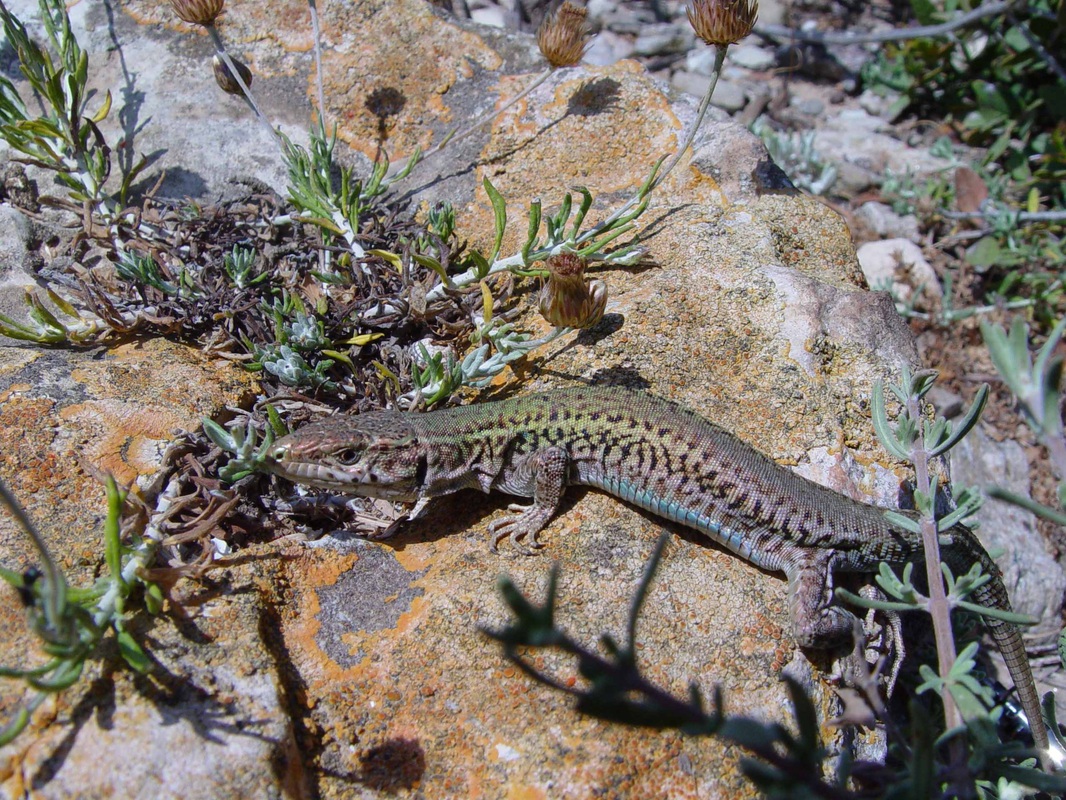Impact of Fragmentation on Genetic Diversity and Disease Resistance in Island Reptiles
|
(Trent
Santonastaso, W. David Weber, Gabriel Fiorini, Heather Hurston, Stephen Ford,
Laura Voith, Jolie Bonanno)
Understanding the role of host genetic diversity in mediating resistance to pathogens has been a long-standing question in evolutionary and conservation biology. This issue is of particular concern in fragmented or bottlenecked populations that have lost variation critical to mounting an effective response to pathogens. In order to better understand how loss in host genetic variation impacts disease resistance, we have assembled a multi-disciplinary team of ecologists, evolutionary biologists and eco-immunologists to assess the impact of fragmentation history on genetic variation and immune function in island populations of the Aegean wall lizard Podarcis erhardii. |
Since the last glacial maximum, rising sea levels progressively fragmented islands within the region into a series of land bridge islands. Isobathymetric was then used to reconstruct the history of each island, allowing us to explicitly consider the impact of island area and age on neutral and major histo-compatibility complex (MHC) variability. Our preliminary results show that the neutral genetic diversity retained in island populations is positively related to island size consistent with the cumulative effects of drift (Hurston et al., 2009). Initial data also suggest that lizards on smaller islands are less able to mount an effective immune response and fight off experimental infection with an exotic hepatozoan. Using next generation sequencing we were then able to assess the impact of island history on MHC variability and found that MHC variation also appears to be largely governed by drift.
As reptilian MHC is still poorly understood, we have recently completed bioinformatics and Bacterial Artificial Chromosome (BAC) library screens of the Anolis carolinensis genome to get a first look at the structure and organization of class II loci in reptiles. We have also begun work to characterize other immunity genes involved in disease resistance. With these data and information from additional immunogenetic markers we hope to address the following questions: What are the relationships between patterns of neutral and adaptive immunogenetic variation? How do these patterns correlate with parasite loads and functional measures of immunocompetence? How does the loss in immunogenetic variation impact fitness? In addressing these questions this study will provide novel insights into the relationship between demographic history, genetic variability and disease susceptibility and in so doing provide a unique opportunity for studying the potential fitness consequences of habitat fragmentation. This work is being conducted in collaboration with Dr. Mike Jensen-Seaman (Duquesne University), Dr. Johannes Foufopoulos (University of Michigan), Dr. Panigiotis Pafilis and Dr. Estratis Valakos (University of Athens), Dr. Cock van Oosterhout (University of East Anglia, U.K.) and Dr. Ken Jones (University of Colorado-Denver).
Hurston H.H., Foufopoulos J., Voith L., Bonanno J., Pafilis P, Valakos E and Anthony N.M. (2009) Effects of fragmentation on genetic diversity in island populations of the Aegean wall lizard Podarcis erhardii (Lacertidae, Reptilia). Molecular Phylogenetics and Evolution 52: 395-405.
Santonastaso T., van Oosterhout C., Jones K.L., Foufopoulos J. and Anthony, N. M. (2017) The effects of historical fragmentation on major histocompatibility complex class II β and microsatellite variation in the Aegean island reptile, Podarcis erhardii. Ecology and Evolution 7: 4568-4581.
As reptilian MHC is still poorly understood, we have recently completed bioinformatics and Bacterial Artificial Chromosome (BAC) library screens of the Anolis carolinensis genome to get a first look at the structure and organization of class II loci in reptiles. We have also begun work to characterize other immunity genes involved in disease resistance. With these data and information from additional immunogenetic markers we hope to address the following questions: What are the relationships between patterns of neutral and adaptive immunogenetic variation? How do these patterns correlate with parasite loads and functional measures of immunocompetence? How does the loss in immunogenetic variation impact fitness? In addressing these questions this study will provide novel insights into the relationship between demographic history, genetic variability and disease susceptibility and in so doing provide a unique opportunity for studying the potential fitness consequences of habitat fragmentation. This work is being conducted in collaboration with Dr. Mike Jensen-Seaman (Duquesne University), Dr. Johannes Foufopoulos (University of Michigan), Dr. Panigiotis Pafilis and Dr. Estratis Valakos (University of Athens), Dr. Cock van Oosterhout (University of East Anglia, U.K.) and Dr. Ken Jones (University of Colorado-Denver).
Hurston H.H., Foufopoulos J., Voith L., Bonanno J., Pafilis P, Valakos E and Anthony N.M. (2009) Effects of fragmentation on genetic diversity in island populations of the Aegean wall lizard Podarcis erhardii (Lacertidae, Reptilia). Molecular Phylogenetics and Evolution 52: 395-405.
Santonastaso T., van Oosterhout C., Jones K.L., Foufopoulos J. and Anthony, N. M. (2017) The effects of historical fragmentation on major histocompatibility complex class II β and microsatellite variation in the Aegean island reptile, Podarcis erhardii. Ecology and Evolution 7: 4568-4581.

